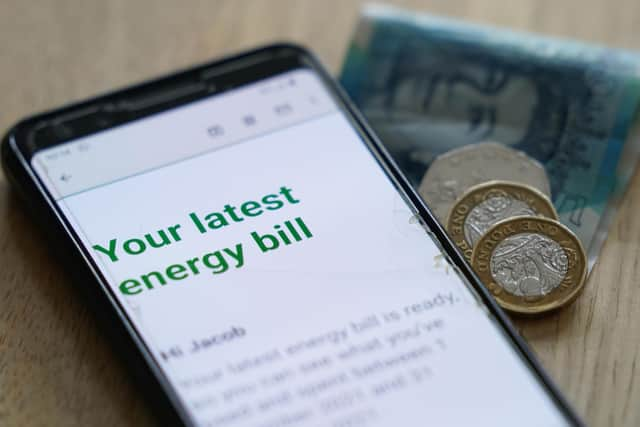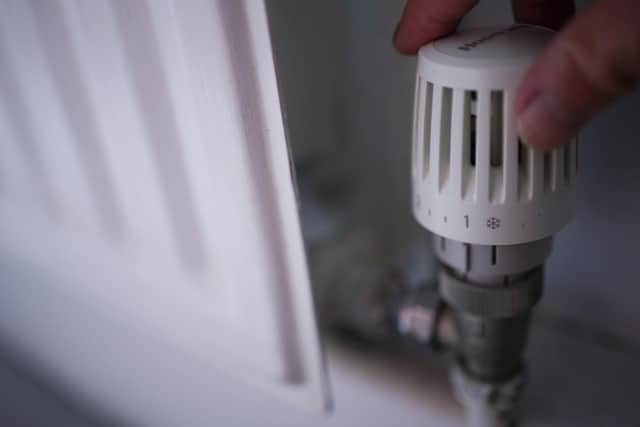Exclusive:500,000 people unlikely to benefit from new Ofgem energy bill protections until 2026, experts warn
and live on Freeview channel 276
More than 500,000 people whose homes get their heating and hot water from a communal heat network may not benefit from protections against soaring energy bills until 2026, independent experts have told NationalWorld.
Heat networks are common in new blocks of flats and social housing - but are excluded from the energy price cap set by the industry watchdog, Ofgem. It’s due to start regulating these networks next year - but the Heat Trust says Ofgem won’t be able to hold suppliers to account “in a meaningful way” for some time.
Heat networks explained
Advertisement
Hide AdAdvertisement
Hide AdCommunal heat networks are designed to be more energy efficient than standard gas and hot water supplies - and have been promoted by the government as a way of helping meet its ambition to deliver net zero carbon emissions. It’s estimated there are around 14,000 of them in the UK.
Rather than each property in a block of flats having its own boiler, there’s a large central heat source that everyone shares called an “energy centre”. It generates heat and hot water and pumps it throughout the building using insulated pipes. The maintenance costs are split between all the residents - in theory reducing the financial burden if something goes wrong - and landlords have fewer boilers to maintain.
The network operators - usually the building’s landlord or a company brought in to run it on their behalf - buy the gas to power the energy centres on the commercial market. Crucially, that means they’re classed as commercial systems, even though they’re supplying domestic customers, and so aren’t covered by Ofgem’s price cap - the maximum amount suppliers can charge people with conventional heating systems for their gas and electricity.


In the past, firms running communal heat networks could buy gas very cheaply - sometimes at less than half the domestic rate - meaning customers benefited from much lower bills. But wholesale prices shot up in the wake of the war in Ukraine. Operators could no longer purchase cheap gas, and have in the last year or so been passing on these higher costs to residents.
Debt concerns
Advertisement
Hide AdAdvertisement
Hide AdSome people have seen their bills jump by more than 500%, and are having to pay several hundred pounds a month. Residents in one south London block of flats - who didn’t want to be named - said the situation was “insane” and “stressful” and meant they had to ask the operator for a payment plan to spread costs they couldn’t currently afford. Other residents faced with large backdated bills were withholding payment altogether.
Lisa Gregory, from the consultancy Ginger Energy, told NationalWorld the situation was “horrific” and made worse by some operators “panicking” and locking into a 12-month gas supply contract when commercial prices were still high.
“I’ve not come across any scenarios where landlords are deliberately trying to take additional funds from residents”, she said. “They just potentially do a poor job of purchasing the gas from the start”.
Stephen Knight from the Heat Trust - an independent, non-profit organisation that holds the heat network industry to account - agrees. “Market gas prices have fallen back now so dramatically they’re only just above pre-crisis levels so any operator out there wanting to enter a new gas contract right now can get gas really cheaply”, he told NationalWorld.
Advertisement
Hide AdAdvertisement
Hide Ad“The problem is that some of them are stuck in contracts paying through the roof. When that gets passed on, that will inevitably lead to a lot of customers getting into debt. There is a real risk at the moment”.
Criticism of slow government support
To try to address soaring costs, last autumn the government announced the Energy Bill Relief Scheme (EBRS) - giving heat network operators some money back on the commercial gas they bought. The savings were then passed onto customers via a discount applied to their bill.
The EBRS ended on March 31 this year - and was replaced in April by the similar-sounding but less generous Energy Bill Discount Scheme (EBDS). But ministers only confirmed that heat network users would continue to benefit on March 28 - three days before the previous scheme ended. In addition, operators have to apply for the discount themselves, meaning it will take time to filter through to customers.
Knight says this delay has had serious consequences. “Many landlords will have fixed their heat cost back in February before the EBDS was announced - assuming gas would still be as expensive as it was then. A lot of them have got fixed-in high costs for the next year and some of them might not apply the discount for months so they’ll be collecting thousands and thousands of pounds from residents only to have to give some of it back next year”.
Advertisement
Hide AdAdvertisement
Hide AdThe Liberal Democrat Munira Wilson and eight other MPs wrote to the government in March, demanding that heat network customers be included in the EBDS.


Wilson told NationalWorld: “Thousands of families on estates or blocks of flats on heat networks have been left high and dry by this government during the energy bill crisis. Ministers have done nothing but penalise residents and housing associations for making the greener choice, announcing only at the very last minute that support would continue from April”.
“The government’s failure to support families has turned what should be an opportunity into a nightmare.”
In a statement to NationalWorld, the Department for Energy Security and Net Zero said: “The Energy Bill Discount Scheme was delivered on time, with support backdated to cover all energy usage between 1 April 2023 to 31 March 2024”.
Advertisement
Hide AdAdvertisement
Hide Ad“This will ensure customers on heat networks do not face disproportionately higher bills”.
New protections could take another three years
The government’s Energy Security Bill - which is currently going through Parliament - will make Ofgem the regulator of heat networks. It says this change will help “ensure consumers get a fair price and reliable supply of heat”. Ministers hope the bill will be passed by the end of the year, with the regulations coming into force in 2024.
But Stephen Knight says this is only half the battle. “Legislation just gives you the outline powers”, he points out. “The government will then need more legislation to put in the framework of rules and procedures which will have to be consulted on before they’re implemented”.
“Then there will be a transition period for heat network operators - basically a period of grace for at least a year - possibly longer. This will probably start in 2025 so in practice we’re looking at up to three years before anyone is going to start holding some of these heat suppliers to account in any meaningful way”.
Advertisement
Hide AdAdvertisement
Hide AdMunira Wilson has raised similar concerns, calling progress in bringing the sector within the Ofgem price cap “painfully slow”.
In response, the government told NationalWorld: “We do not recognise these claims and expect heat networks regulation to come into force in 2024.”
Possible legal action
While the wait for regulation continues, the law firm Leigh Day is exploring a possible legal claim on behalf of heat network customers. It says affected customers may have grounds for one because they’re usually not allowed to change their provider - a possible breach of competition law - and are sometimes facing unnecessarily high prices because their network isn’t energy efficient enough.
Leigh Day told NationalWorld it had received 230 expressions of interest in the investigation - which began at the start of the year - and said its work was ongoing.
Comment Guidelines
National World encourages reader discussion on our stories. User feedback, insights and back-and-forth exchanges add a rich layer of context to reporting. Please review our Community Guidelines before commenting.
